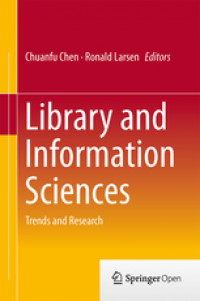
Computer File
Library and Information Sciences: Trends and Research
The publication of "Library and Information Sciences: Trends and Research" is undoubtedly a great challenge for us. I am pleased that each of the articles contained in this book is based on cutting-age studies of authors. This book is divided into five parts. In the first chapter, Dr. Forest Woody Horton introduces the opportunities and challenges faced by library and information literacy profession in the society, followed by Dr. Alease J. Wright’s contribution on the key role of librarians in the future information literacy education. The last chapter of this part is featured with a discussion panel at which seven authors present their thoughts on information literacy. In the second part Professor Elizabeth D. Liddy discusses the trends in LIS education by examining the vision of the iSchool movement and detailing its practice in Syracuse University. In the third part, Professor Jin Zhang et al. first uses visual data mining technology to detect the relationship and pattern between terms on Q&A site. Next, Professor David Nicholas et al. consolidates the reliability of Google Analytics using as information search and research data source through empirical study on the multimedia website. Dr. Tingting Jiang then conducts a critical analysis of the theoretical foundations, systems features, and research trends of exploratory search. The fourth part starts with Professor Peter Ingwersen’s contribution in which he stresses the importance of building an academic accreditation framework for scientific datasets, studies its metrological characteristics, and proposes the dataset usage indicator as an indicator of dataset management framework. After that, Professor Feicheng Ma, et al. present their findings in knowledge discovery of complex networks research literatures. This part ends with Professor Ruth A. Pagell’s explorations on the relationship between bibliometrics and university rankings. The fifth part includes an article by Mr. Eugene Wu, detailing the birth and development process of East Asian Library in North America.
Ketersediaan
| E00018 | 020 CHE l | My Library | Tersedia |
Informasi Detail
- Judul Seri
-
-
- No. Panggil
-
020 CHE l
- Penerbit
- London : SpringerLink.com., 2014
- Deskripsi Fisik
-
xiv, 177 pages : illustration , cm.
- Bahasa
-
English
- ISBN/ISSN
-
9783642548123
- Klasifikasi
-
020
- Tipe Isi
-
text
- Tipe Media
-
computer
- Tipe Pembawa
-
other (computer)
- Edisi
-
-
- Subjek
- Info Detail Spesifik
-
-
- Pernyataan Tanggungjawab
-
-
Versi lain/terkait
Tidak tersedia versi lain
Komentar
Anda harus masuk sebelum memberikan komentar
 Karya Umum
Karya Umum  Filsafat
Filsafat  Agama
Agama  Ilmu-ilmu Sosial
Ilmu-ilmu Sosial  Bahasa
Bahasa  Ilmu-ilmu Murni
Ilmu-ilmu Murni  Ilmu-ilmu Terapan
Ilmu-ilmu Terapan  Kesenian, Hiburan, dan Olahraga
Kesenian, Hiburan, dan Olahraga  Kesusastraan
Kesusastraan  Geografi dan Sejarah
Geografi dan Sejarah  E-Book
E-Book